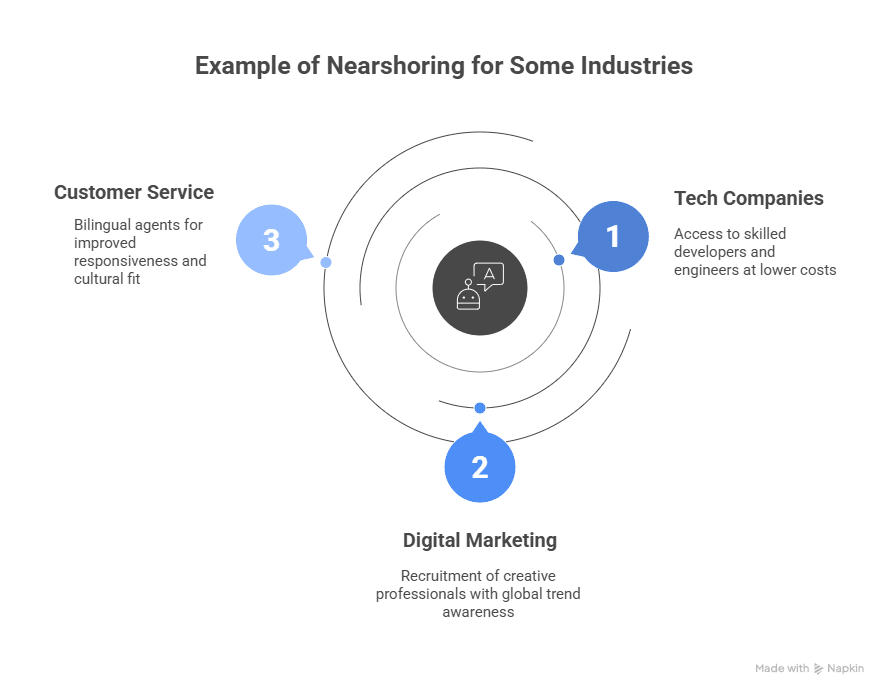What are the main benefits of nearshoring recruitment for US-based companies? The main advantages entrepreneurs and business owners in America enjoy when nearshoring are:
- Time Zone Alignment
- Lower Labor Costs with High Talent Quality
- Cultural and Linguistic Compatibility
- Faster Hiring and Onboarding
- Improved Team Retention Rates
- Scalability and Flexibility
If you’re exploring strategies to optimize your business operations, nearshoring offers a compelling solution. By relocating processes or services to nearby countries, you can reduce costs, improve collaboration, and streamline supply chains without the challenges of offshoring to distant locations. This approach is particularly advantageous for industries requiring real-time communication and faster turnaround times.
Let’s explore all you need to know to boost your business growth.
Time Zone Alignment
Time zone alignment enhances real-time collaboration between your team and nearshore employees. When you source talent from nearby regions, overlapping work hours allow recruiters, hiring managers, and employees to communicate without delays. This improves responsiveness during sourcing, screening, interviewing, and onboarding processes.
Aligned time zones streamline candidate shortlisting by enabling immediate feedback loops. Hiring managers can evaluate candidates faster when nearshore staffing agencies operate within similar business hours. This reduces bottlenecks in the recruitment funnel.
Employee productivity increases when teams share synchronous schedules. Nearshoring supports seamless handoffs for tasks like job matching or skills assessment since both parties are available simultaneously. CEOs benefit from improved operational efficiency as projects progress without interruptions caused by time differences.
Recruitment KPIs such as time-to-hire and candidate engagement rates improve with aligned working hours. You can track performance metrics more effectively when communication flows uninterrupted across sourcing and vetting stages.
Lower Labor Costs with High Talent Quality
Nearshoring reduces labor costs while maintaining access to skilled professionals. Nearshore recruitment allows you to source and recruit talent from regions where salaries are lower than in your home country, but expertise remains competitive.
For example, Latin America offers digital marketing professionals at rates 30-50% lower than those in the US or Western Europe, according to Accelerance.
Recruiters can optimize budgets by targeting countries with cost-effective wages without compromising quality. Nearshore staffing agencies help hiring managers screen and evaluate candidates who meet specific technical requirements. This ensures that job matching aligns with your operational goals while staying within budget constraints.
Hiring managers benefit from scalable recruitment processes when collaborating with nearshore teams. You can delegate sourcing, vetting, and onboarding tasks to experienced recruiters familiar with local markets. These experts assess language proficiency, technical skills, and cultural fit before shortlisting candidates for interviews.
CEOs seeking rapid team expansion often prioritize cost efficiency alongside performance metrics like retention rates and employee satisfaction. Nearshoring supports these objectives by providing a steady pipeline of qualified employees who integrate seamlessly into existing workflows.
Cultural and Linguistic Compatibility
Cultural alignment simplifies collaboration between your teams and nearshore employees. Shared cultural values reduce misunderstandings during sourcing, screening, and onboarding processes. For example, hiring managers working with Latin American candidates often benefit from similar work ethics and communication styles compared to US-based teams.
Linguistic compatibility ensures clear communication throughout the recruitment funnel. Nearshore regions like Eastern Europe or Latin America frequently offer professionals fluent in English, minimizing language barriers during interviews, skills assessments, and job matching. This fluency improves candidate shortlisting accuracy by enabling recruiters to evaluate technical expertise without misinterpretation.
Recruiters gain an advantage when sourcing talent from culturally aligned countries where holidays, workplace norms, and business etiquette align closely with their operations. These similarities streamline employee integration into existing workflows while reducing time spent addressing potential conflicts.
By leveraging nearshore staffing agencies familiar with local cultures and languages, you can delegate tasks such as vetting candidates for cultural fit or evaluating linguistic proficiency. This approach optimizes hiring timelines while ensuring employees adapt seamlessly to your organizational environment.
Faster Hiring and Onboarding
Nearshoring accelerates hiring timelines by streamlining recruitment processes. Recruiters source candidates from nearby regions with overlapping time zones, enabling real-time communication during the sourcing, screening, and interviewing stages. This alignment reduces delays in scheduling interviews or coordinating skills assessments.
Hiring managers benefit from nearshore staffing agencies that vet candidates locally. These agencies evaluate technical expertise, cultural fit, and language proficiency before shortlisting applicants. By delegating these tasks to regional experts, you optimize the recruitment funnel while focusing on strategic decision-making.
Onboarding becomes faster due to cultural compatibility and linguistic fluency. Employees from nearshore locations often share similar work ethics and communication styles with your existing teams. This compatibility minimizes onboarding challenges like miscommunication or adaptation issues, allowing new hires to integrate seamlessly into workflows.
Faster hiring directly impacts operational scalability. When you quickly fill critical roles with qualified employees, project timelines remain intact without compromising quality standards.
Nearshoring ensures that businesses meet growth demands efficiently while maintaining high performance across teams.
Improved Team Retention Rates
Nearshoring enhances team retention by fostering cultural alignment and operational consistency. Employees from nearshore regions often share similar work ethics, communication styles, and professional values with your existing teams.
This compatibility reduces workplace friction, creating an environment where employees feel understood and valued.
Retention improves when you recruit candidates who align with your company culture. Nearshore staffing agencies vet professionals locally, assessing not only technical skills but also their adaptability to your organizational structure.
By sourcing talent from culturally aligned regions like Latin America or Eastern Europe, hiring managers can minimize turnover caused by misaligned expectations or integration challenges.
Onboarding processes become smoother due to linguistic fluency and shared time zones. Real-time collaboration during onboarding ensures new hires quickly adapt to workflows without delays in training or task delegation. When employees integrate seamlessly into operations, they’re more likely to remain engaged and committed long-term.
Cost-effective recruitment through nearshoring also contributes to retention rates. Offering competitive salaries relative to local markets while maintaining lower costs compared to domestic hiring allows you to attract top-tier talent without overextending budgets. Satisfied employees receiving fair compensation are less inclined to seek opportunities elsewhere.
Tracking performance metrics such as employee satisfaction scores helps optimize retention strategies further. Nearshore partnerships enable recruiters to analyze these KPIs effectively, ensuring proactive measures address potential dissatisfaction before it escalates into attrition.
Scalability and Flexibility
Nearshoring enhances your ability to scale operations quickly by providing access to a larger talent pool in nearby regions. Recruiters can source candidates from countries with overlapping time zones, enabling faster communication during sourcing, screening, and interviewing stages. This streamlined process reduces delays when filling critical roles.
Hiring managers gain flexibility by delegating recruitment tasks like candidate shortlisting and skills assessment to nearshore staffing agencies. These agencies vet applicants locally for technical expertise, cultural fit, and language proficiency before presenting them for final evaluation. This delegation allows you to focus on strategic decision-making while ensuring quality hires.
You can adjust team sizes efficiently through nearshoring without overextending budgets. For example, businesses hiring software developers in Latin America save 30-50% compared to US-based salaries while maintaining high skill levels. Contracting employees from cost-effective regions lets you allocate resources dynamically based on project demands.
Onboarding becomes smoother due to cultural alignment between nearshore employees and existing teams. Employees sharing similar work ethics integrate into workflows faster, minimizing disruptions during scaling efforts. By leveraging these benefits, CEOs can manage rapid growth without compromising operational performance or employee satisfaction metrics.
Function-Specific Benefits of Nearshoring
Nearshoring offers targeted advantages for specific business functions, enabling recruiters and hiring managers to optimize processes like sourcing, screening, onboarding, and retention. By leveraging nearshore staffing agencies and culturally aligned talent pools, you can streamline operations while maintaining cost efficiency.

Nearshoring for Tech Companies
Tech companies benefit from nearshoring by accessing skilled developers and engineers in nearby regions with overlapping time zones. Recruiters can source candidates proficient in programming languages such as Python or Java at rates 30-50% lower than US salaries.
Hiring managers gain flexibility by delegating technical skills assessments to nearshore staffing agencies that vet candidates locally before shortlisting them. This ensures hires meet project-specific requirements without delays.
Onboarding becomes faster due to cultural compatibility between nearshore employees and existing teams. For example, Latin American professionals often share similar work ethics with US-based tech teams, reducing integration challenges.
Nearshoring also supports scalability during product launches or software development cycles by allowing you to contract additional resources quickly without overextending budgets.
Nearshoring for Digital Marketing and Creative Services
Digital marketing firms leverage nearshoring to recruit designers, content creators, SEO specialists, and social media managers fluent in English and familiar with global trends. Sourcing talent from regions like Eastern Europe provides access to professionals experienced in tools such as Adobe Creative Suite or Google Analytics at competitive costs.
Hiring managers save time by outsourcing candidate screening tasks—such as portfolio evaluations—to local staffing agencies specializing in creative roles.
These agencies ensure shortlisted candidates align with your brand’s aesthetic standards and communication style. Onboarding is seamless when linguistic fluency minimizes miscommunication during strategy briefings or campaign planning sessions.
Nearshoring also enhances operational agility by enabling you to scale creative teams based on seasonal demand spikes or client acquisition surges. Delegating resource allocation tasks ensures projects stay on schedule without compromising quality benchmarks.
Nearshoring for Customer Service and Support
Customer service departments improve responsiveness through nearshoring by recruiting bilingual agents from regions like Central America or the Philippines who operate within compatible time zones.
Nearshore Staffing agencies help screen applicants for language proficiency, problem-solving skills, and familiarity with CRM platforms like Salesforce or Zendesk before recommending them for interviews.
Real-time communication between hiring managers and candidates accelerates recruitment timelines while ensuring a strong cultural fit. Once hired, new employees integrate smoothly into workflows due to shared professional values that reduce friction during training programs.
Retention improves when offering competitive salaries relative to local markets while maintaining budget efficiency compared to domestic hires.
Tracking KPIs such as first-call resolution rates or customer satisfaction scores helps evaluate team performance post-onboarding, ensuring consistent service delivery across all channels.
Why Smart Companies Are Nearshoring—and Winning
You don’t scale by cutting corners. You scale by making sharper moves.
Nearshoring gives U.S. businesses the upper hand: top-tier talent, real-time collaboration, and zero late-night Zoom calls. You get the cost advantages of offshore staffing without the headaches of time zone chaos or culture clash.
The result? Faster hiring. Better retention. Teams that actually work like a team.
That’s what Scale Army delivers. We’re the offshore staffing agency U.S. companies trust to build nearshore teams that speak your language—literally and professionally. From marketing pros to customer support powerhouses, we find the right people in the right time zones, ready to perform from day one.
If you’re serious about scaling, don’t just outsource. Nearshore with intent.
Book your strategic call now—and build a team that moves at your speed.
Frequently Asked Questions
What is nearshoring?
Nearshoring is a business strategy where companies relocate processes or services to nearby countries. This approach helps reduce costs, improve collaboration through time zone alignment, and access skilled talent in culturally compatible regions.
How does nearshoring benefit recruitment?
Nearshoring streamlines recruitment by enabling real-time communication during sourcing, screening, and interviewing due to overlapping time zones. It also provides access to cost-effective talent pools while ensuring cultural and linguistic compatibility for smoother onboarding.
Why is cultural alignment important in nearshoring?
Cultural alignment reduces misunderstandings between teams and improves collaboration. Shared values and work ethics simplify integration, enhance productivity, and boost employee satisfaction during the hiring process.
Can nearshoring help reduce labor costs?
Yes, nearshoring allows businesses to hire skilled professionals from regions with lower salaries without compromising quality. For example, developers in Latin America often charge 30-50% less than their US counterparts.
How does nearshoring impact team scalability?
Nearshoring enhances scalability by providing flexible access to larger talent pools in nearby regions. Businesses can quickly adjust team sizes based on project demands while maintaining budget efficiency.
What industries benefit most from nearshoring?
Industries like tech, digital marketing, and customer service benefit significantly from nearshoring. They gain access to skilled professionals at lower costs while improving responsiveness and operational agility.
Does nearshoring improve retention rates?
Yes, nearshore employees often share similar professional values with existing teams, reducing workplace friction. Cost-effective recruitment also enables competitive salaries that attract top-tier talent and support long-term retention.
How do time zones affect nearshore collaboration?
Overlapping time zones enable real-time communication between teams and candidates during recruitment stages like interviews or assessments. This improves responsiveness and shortens hiring timelines.
Are language barriers an issue in nearshoring?
No, many popular nearshore regions like Latin America or Eastern Europe have professionals fluent in English. Linguistic compatibility ensures smooth communication throughout the hiring process.
Should I use a staffing agency for nearshore hiring?
Using a staffing agency simplifies the process as they vet candidates locally for technical skills, cultural fit, and language proficiency. This delegation saves time while ensuring high-quality hires tailored to your needs.




